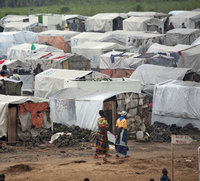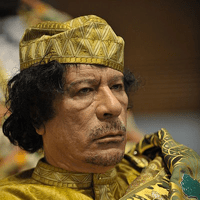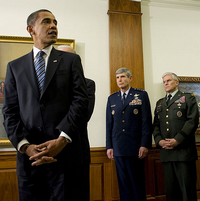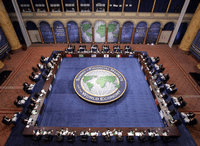This report by the Russian government-owned news station Russia Today focuses on predictions toward the end of American global economic dominance. The report includes soundbites from Francis Fukuyama and highlights an International Monetary Fund forecast that, after more than a century as the world’s largest economy, the U.S. will be usurped by China as early as 2016.
Global Archive
Free Newsletter

What do policymakers have to read in order to be “informed” on international affairs — or just to be thought of as informed? The question, which Daniel Drezner posed yesterday, is more than just a theoretical exercise, as every summer the Patterson School assigns a list of seven or eight books on international affairs to its new and returning students. Summer reading lists are not uncommon in academia, in both graduate and undergraduate programs. Many universities assign one or more books to give faculty and new students a common intellectual foundation. The Patterson list has a twofold purpose. The first […]

When the Arab uprisings started spreading across the Middle East, human rights and democracy activists around the world held high hopes that the peaceful push for reform would spread to the many countries where populations live under repressive leadership. After protesters succeeded in overthrowing Egyptian President Hosni Mubarak, a British member of parliament declared, “I would like to see regime change in Zimbabwe and Burma.” The sentiment was optimistically echoed by exiles of repressive states and their supporters in many places. For a moment, it seemed as if the exultant Egyptian protesters might just unleash a wave of freedom that […]

The NATO campaign in Libya has just begun its second month, and the situation on the ground is not improving. The defenses of Misurata are deteriorating, and rebel forces appear to be falling back from Adjadibya. In spite of the deteriorating tactical situation, however, the leaders of France, the United Kingdom and the United States have formulated in very certain terms the maximalist strategic goals of the campaign: the end of Moammar Gadhafi’s grip on power. The basic problem remains one of complete incoherence between strategic goals and operational means. Paris, London and Washington want Gadhafi gone. However, none of […]
The International Monetary Fund has proposed that it be allowed to borrow directly from financial markets in order to raise capital for its lending programs. In an email interview, Daniel McDowell, a doctoral student at the University of Virginia and an expert in international lending practices, discussed the IMF’s proposal. WPR: Why is the IMF seeking the ability to borrow directly from financial markets? Daniel McDowell: The IMF wants to be a fully capable international lender of last resort (ILOLR). Simply put, an ILOLR is an actor that is willing and able to provide credit during crises to solvent but […]

Although events in the Middle East confirm that the power of an angry crowd in a public square remains potent, the Internet is fast becoming the medium of choice for spreading political ideas. The number of global Internet users has doubled during the past five years, and now exceeds 2 billion people. In response, governments worldwide are seeking new means to influence and often control this discourse. Freedom House’s newly released report, “Freedom on the Net 2011: A Global Assessment of Internet and Digital Media” (.pdf), shows how governments have employed deviously creative tactics to control Web sites, blogs and […]

The cables were cut multiple times, despite being buried beneath the Mediterranean seabed, five miles off the Egyptian coast, near Alexandria. As a result, Internet finance and commercial traffic stalled in at least 10 Middle Eastern and Asian countries in early 2008. More than 80 million Web users in India, Pakistan, Egypt and Saudi Arabia had connection problems. Egypt and Pakistan alone lost 70 percent of their digital connections to the outside world. “It even affected [U.S. Central Command],” said James Lewis, director of the technology and public policy program at the Center for Strategic and International Studies (CSIS), a […]

Editor’s note: The following article is one of 30 that we’ve selected from our archives to celebrate World Politics Review’s 15th anniversary. You can find the full collection here. Cyberspace has long been seen as shifting power toward the individual, with attacks over the past decade on corporations, governments and other weighty institutions largely corroborating this view. But while the structure of cyberspace itself will always lend significant and previously unavailable advantages to individuals, we are now entering a period where governments and institutions are beginning to regain the upper hand against asymmetric cyberwarfare. In his 1996 "Declaration of the Independence […]

In June 2009, a computer worm called Stuxnet was unleashed against the nuclear enrichment plant at Natanz, Iran. Designed to infect the operating system used by the Iranians to control their nuclear centrifuges, Stuxnet significantly disrupted, and thus delayed, Iranian nuclear efforts, according to a New York Times report on Jan. 15, 2011. The Times report also provided a breathtaking peek behind the scenes of what appears to have been a large and complex covert operation to develop the Stuxnet worm. If the revelations are true, then the Stuxnet attack provides significant insights about the potential character of war by […]

The World Bank’s 2011 World Development Report is out, and this year’s version highlights the interplay between “conflict, security, and development.” That’s a welcome theme to someone who’s spent the last decade describing how globalization’s spreading connectivity and rules have rendered certain regions stable, while their absence has condemned others to perpetual strife. But although the growing international awareness of these crosscutting issues is long overdue, the report ultimately disappoints by focusing only on the available tools with which great powers might collaborate on these stubborn problems, while ignoring the motivations that prevent them from doing so. First, the good […]
The world’s emerging economic giants have called for a reform of the global financial system at their annual summit. According to this report by the Russian government-owned global news station Russia Today, the so-called BRICS nations — Brazil, Russia, India, China and South Africa — have also commented on NATO’s operation in conflict-torn LIbya.

Much of the global perception of America’s long-term decline as the world’s sole surviving superpower is in fact driven by our fiscal decline. That’s why I was disturbed to hear Democrats so quickly dismiss GOP Sen. Paul Ryan’s bold, if flawed, federal budget proposal on the grounds that it would “end Medicare as we know it.” Frankly, arresting our decline means ending a lot of things “as we know them.” That’s simply what being on an unsustainable path forces you to do. But as difficult as reforming federal entitlement programs will be, it is absolutely necessary, because a look at […]

One year ago, Moammar Gadhafi’s Libya was being praised for its efforts to become a responsible stakeholder in the international system. Meanwhile, Gadhafi’s children, especially his son Saif al-Islam, were being cultivated as the best hope for initiating a process of political and economic reform, so that Libya might replicate the path blazed by Taiwan, where another dynastic transfer of power from father to son led to democratization. Indeed, Gadhafi’s son Khamis was in the United States on a professional internship when the current crisis broke out. He was quickly recalled to take command of the 32nd Reinforced Brigade of […]
The potential long-term impact of the Libya intervention has more to do with changing people’s thinking than with changing the reality on the ground in Libya. The past 40 years have already demonstrated that the West can manage the discrete problem represented by Moammar Gadhafi. What it cannot handle is the aggregate problem represented by a continuation of the status quo, both in the broader region but also in the shifting geopolitical landscape beyond it. By highlighting a number of major shortcomings in that status quo, the Libyan intervention just might be the wake-up call needed to generate a more […]

Does the United States have a special responsibility to manage international affairs? This question has come to inform much of the debate about the role that the U.S. is currently playing in military operations over Libya. Glenn Greenwald of Salon has argued that the idea that the United States has the right to intervene in the internal politics of other countries has its source in a widespread acceptance of American Exceptionalism, the notion that the United States is different, special and privileged compared to other nations. Writing from a realist perspective, Stephen Walt echoed this claim, arguing that both neoconservatives […]

The notion that the underlying distribution of global power is shifting from West to East and from North to South is not new. For more than a decade, astute observers have noted that countries like China, Brazil and India, among others, were consistently posting impressive economic growth rates and closing the gap separating them from the advanced industrial economies. Yet, even as the reality of their economic rise was impossible to dispute, the structures of global financial governance did not adapt to reflect these changes. Of course, this is not surprising, as international institutions are notoriously resistant to reform. As […]
